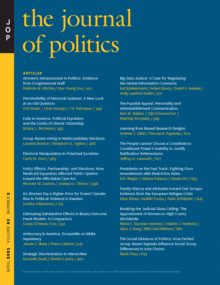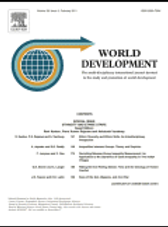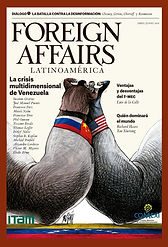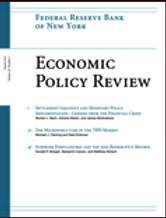Research
Research Articles
"Crude Credit: The Political Economy of Natural Resource Booms and Sovereign
Debt Management." World Development (180), August. 2024.
With Iasmin Goes, Colorado State University.
Oil, gas, and minerals have notoriously adverse effects on institutional quality. But when global liquidity is high, risk-tolerant investors are more willing to lend to all borrowers, even resource-rich countries with low-quality institutions. Despite the availability of cheaper credit during commodity booms, we argue that countries do not increase current borrowing to mitigate future revenue shortfalls during commodity busts. Instead, they rely on resource windfalls to meet their current financing needs, fearing they would otherwise forfeit national policy discretion to global financial markets. We leverage primary evidence from extensive field research across five Latin American countries to show that national economic officials are wary of high indebtedness, after past commodity booms ended in cycles of lofty spending, borrowing, and default. For sovereign borrowers, high bond market indebtedness often reduces government discretion over economic policy, whereas windfalls increase it; all else equal, national governments will favor the latter. Using data on 22 Latin American and Caribbean countries from 1996 to 2020, we find that governments issue bonds less frequently, in smaller amounts, as their GDP share from resource rents or oil and gas production increases.
"Global Contagion Risk and IMF Credit Cycles: Emergency Exits and Revolving Doors." Regulation and Governance. 18(3): 851-873, 2024.
With Sujeong Shim, NYU Abu Dhabi.
Why does the International Monetary Fund (IMF) exit its lending relationships before member states have resolved their financial crises? It is particularly surprising given that the IMF often resumes its lending shortly after its withdrawal. We argue that IMF withdrawals are conditioned by global contagion risk. The tension between the IMF’s mandate of global financial stability and its limited financial resources compels the IMF’s early exit from its lending relationships. During periods of high global contagion, the IMF prioritizes its mandate by continuing its lending despite noncompliance. However, when the IMF perceives minimal contagion risk, it focuses on moral hazard, and willingly cuts its lending ties to preserve its reputation and resources for future crises. Employing a comparative analysis of IMF decision-making in two of its largest borrowers, Argentina and Greece, we find supportive evidence for our claims
“Fighting Past Economic Wars: Crisis and Austerity in Latin America.”
Latin American Research Review 53(1), 2018.
Political economy theory expects that changes in macroeconomic governance are often catalyzed by institutional factors, such as partisanship, elections, or IMF conditionality. I challenge and contextualize this view by incorporating the role of technocratic advisors into a domestic policymaking framework. I contend that presidents from countries with crisis legacies are more likely to appoint mainstream economists that pursue budget discipline. Employing an originally constructed dataset, the Index of Economic Advisors, I conduct an econometric test of 16 Latin American countries from 1961 to 2011. I find that politicians are most likely to appoint mainstream economists who embrace fiscal rectitude in countries with inflation-crisis legacies. Furthermore, these crisis legacies are sticky given the severity of inflationary trauma relative to other types of domestic economic volatility in Latin America. In fact, these effects hold when controlling for both historical and contemporaneous shocks to unemployment.
The Latin American Research Review’s (LARR) Panoramas blog featured my commentary about Venezeula’s elections and economic reform prospects, which also highlighted the article’s main themes.

“The Political Economy of Sovereign Debt: Global Finance and Electoral Cycles.”
The Journal of Politics, 79(2): 2017. With Kaj Thommson, Maastricht University.
Political economy theory expects politicians to use budget deficits to engineer an election-timed boom, known as the political business cycle. We challenge and contextualize this view by incorporating the financial constraints faced by governments into an electoral framework. We argue that the extent of ownership dispersion among creditors has important effects for governments' policy autonomy. Specifically, we contend that when highly indebted governments become more reliant on international bond markets -- as opposed to traditional bank lending -- politicians alter the way they respond to domestic constituents. In an econometric test of 16 Latin American countries from 1961 to 2011, we show that financial decentralization breeds austerity. More specifically, we find that politicians exhibit more fiscal discipline when they fund a greater share of their spending through decentralized bond markets. Furthermore, we find this disciplining effect to be particularly strong during election periods.

“Partisan Technocratic Cycles in Latin America.” Electoral Studies 45(2): 2017.
Special issue, Fat Politics, Lean Politics: Political Survival in Good and Bad Times.
Given their powerful position in presidential cabinets, technocrats are an important transmission mechanism for explaining policy choices in Latin America, but have received less attention compared to some other well-established channels in the comparative political economy literature such as elections or the tenure of democracy. In this paper, I incorporate the role of technocratic advisors into a domestic policymaking framework. I contend that left governments are more likely to appoint technocrats, or ministers with mainstream economics training, to signal their commitment to sound governance to the electorate, the business community, and international investors. This partisan technocratic pattern, however, is conditioned by a country's place in its business cycle. During periods of high economic growth, left governments are more likely to appoint heterodox advisors that drift from fiscal discipline. Employing an originally constructed data index, the Index of Economic Advisors, I conduct a statistical test of 16 Latin American countries from 1960 to 2011, finding partisan shifts in technocratic appointments and fiscal governance that are conditioned by national business cycles.
GW's Institute for International Economic Policy (IIEP) featured a commentary, summarizing some of the main themes of the article.

“Banking Unconditionally: The Political Economy of Chinese Finance in Latin America.”
Review of International Political Economy, 23(4), 2016.
Globalization scholars have long-debated to what extent economic integration, and specifically, mobile private capital constrains national policymaking. With Western capital reeling from the 2008 financial crisis, state-owned capital made inroads globally. China, as the world’s largest saver, expanded its cross-border lending, funneling almost US$300 billion to developing countries since the crisis. What are the implications for debtor governments’ room to maneuver? I argue that the rapid global expansion of China’s state-led capitalism, an important form of patient capital, has transformed the traditional relationship between economic interdependence and national policy autonomy. Without the market’s threat of short-term capital withdrawal, national governments have considerably more room to maneuver. Given the recent emergence of Chinese financing, I employ a comparative case study analysis of two of China’s largest debtors, Brazil and Venezuela, before and after the introduction of Chinese credit. I find that government budget deficits increase as Chinese state-to-state financing accounts for a larger share of total external public financing. These findings offer important new insights for the study of globalization, Latin American development, and China-Latin American relations, by helping explain the conditions under which nations veer from Western governance models.

“The Political Obstacles to Greater Exchange Rate Flexibility in China.”
World Development, 34(7), 2006.
Building on the politics of exchange rate literature, I claim that interest group pressures on exchange rate policy are often conditional on the over/under valuation of national currencies. Employing the case of China, I confirm previous finding that the larger a country’s tradable sector (as measured by the size of the manufacturing sector), the greater its political influence over exchange rate choices. However, I find that an undervalued currency increases the likelihood that the tradable sector advocates for sustaining a fixed exchange rate, while an overvalued currency prompts it to instead support exiting the currency peg. Finally, I find that the extent of interest groups’ clout with the government ultimately depends on the government’s own political priorities, such as employment and social stability in the case of China.

Policy-Relevant Research
"The Story of the Creditor Trap: How China Reduced its Venezuelan Risk."
With Michael Penfold.
Foreign Affairs LatinoAmérica, April/June issue, 19(2): 2019
For more details, see here

"China-Venezuelan Economic Relations: Hedging Venezuelan Bets with Chinese Characteristics."
With Michael Penfold.
Venezuela's Authoritarian Allies: International Relations and Regime Survival, Edited by Cynthia Arnson. Latin American Program Reports on the Americas No. 43, Chapter 3 (Washington, D.C.: Woodrow Wilson International Center for Scholars), 2021
To download the full book, see the Woodrow Wilson Center publications.

Other Academic Work
“Do Elections Hurt Developing Economies?”
Available at SSRN’s Political Institutions: Bureaucracies & Public Administration, 2(14) 2008.
“The Revised Bank of Japan Law: A Framework for Enhanced Autonomy?”
Federal Reserve Bank of New York, 1998.
“On Political Equality.” Conducted research and data analysis for book.
With Professor Emeritus Robert Dahl.
“The Future of Globalization: Explorations in Light of Recent Turbulence.”
Co-authored introductory chapter for book. With President Ernesto Zedillo of Mexico.






